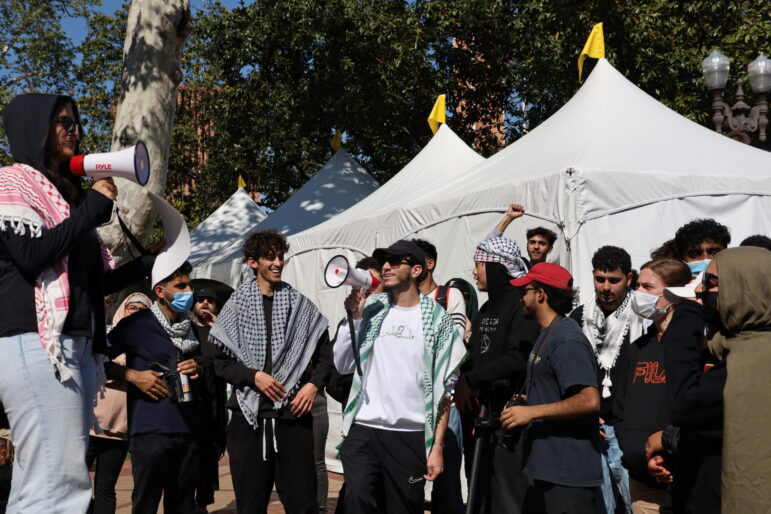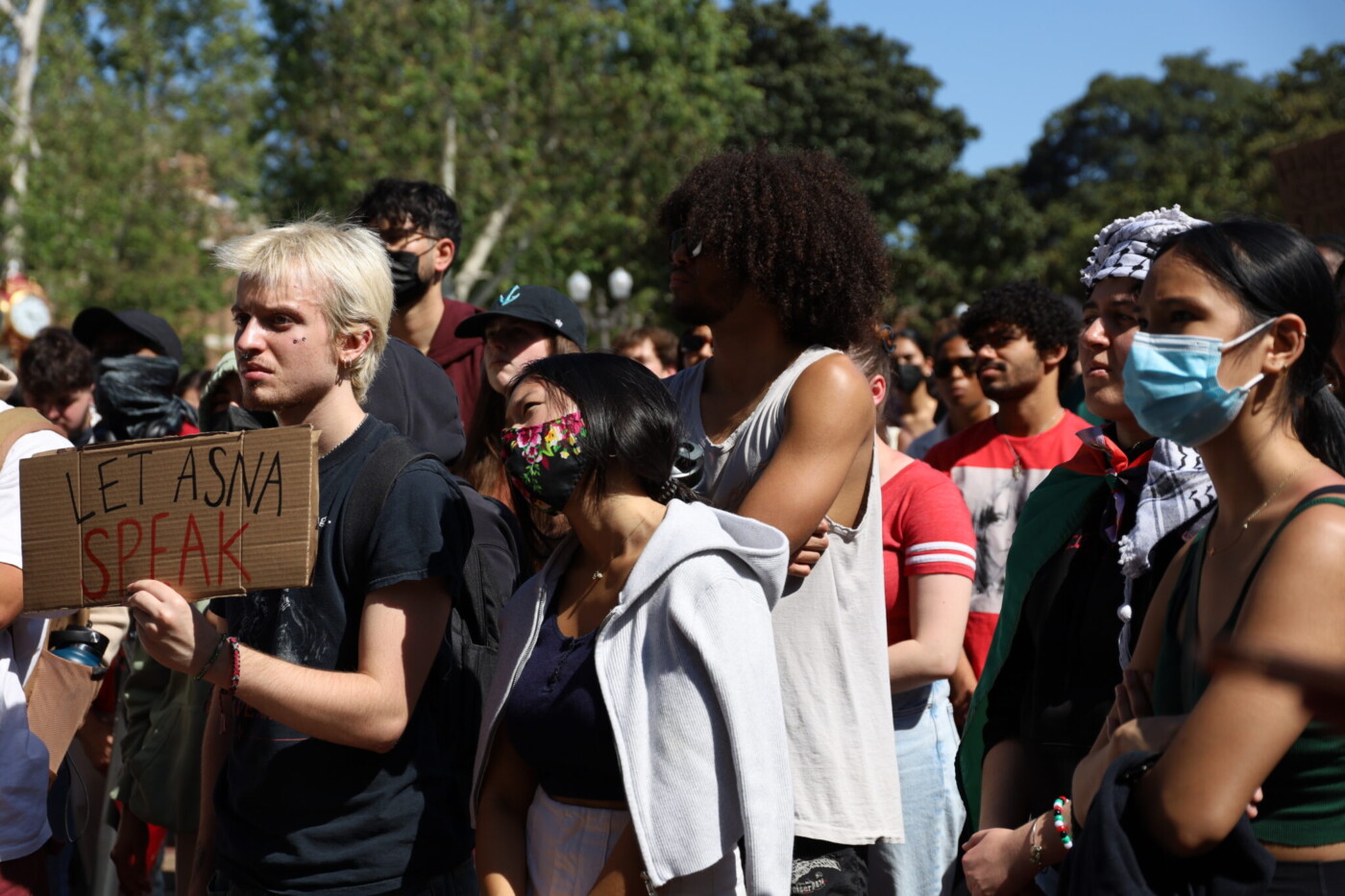Holding Palestinian flags and signs calling for “Justice for Asna,” hundreds of University of Southern California students gathered Thursday to march in support of a Muslim valedictorian whose planned commencement speech was canceled by the university.
The students, many of them wearing hoodies and masks, which they said symbolized the silencing of the valedictorian, first gathered by the Tommy Trojan statue near the center of campus. They then marched across campus, often chanting “let her speak” and holding signs with the same message in the Palestinian colors of red, green, and black.
The march was the latest protest of the university’s decision to cancel the May 10 speech. The valedictorian, Asna Tabassum, is a biomedical engineering major with a minor in resistance to genocide. USC officials said they canceled the speech because of security risks, telling EdSource in a statement Thursday that university leadership made the decision in consultation with campus law enforcement. They did not disclose the specific security risks facing the university.

“While the decision was difficult, it was necessary to maintain and prioritize the security of the USC community during the coming weeks, and to allow those attending commencement to focus on the celebration our graduates deserve,” the university said. “Nothing can take precedence over the safety of our community.”
Pro-Palestinian student groups and other supporters, meanwhile, say the university is perpetuating Islamophobia with its decision.
“It’s very disappointing that USC is very proactive in theory, for students, but then (the university does) not deliver,” USC student Aisha Patel said. “It’s a slap in the face that they won’t let her speak.”
Patel said that as a fellow Muslim woman, she feels represented and supported by Tabassum — and that the university’s decision to cancel her speech “silences the voices of people who visibly look like me.”
Abed Kassem, an international student at USC from Syria, said the decision to cancel Tabassum’s speech “devastated and shocked me to my core.”
“When I came to the U.S., I thought this was a freedom of speech country and I thought I could express myself,” Kassem said. “It’s so upsetting that this is happening. If you can’t express yourself in America, then where can you do that?”
No pro-Israel demonstrators were seen near Thursday’s march.
The tensions between pro-Palestinian and pro-Israeli students at USC and on other college campuses have heightened dramatically since Oct. 7, when Hamas attacked Israel, after which Israel responded with a bombardment of Gaza. The Hamas attack killed about 1,200 people, most of them civilians, and another 240 were taken hostage. More than 30,000 people have been killed in Gaza — mostly women and children — since Israel launched its military response.
The conflict has rattled universities across the country with administrators challenged to uphold freedom of speech amid charges that some speech is hateful antisemitism and Islamophobic.
USC officials have said the decision to cancel Tabassum’s speech has nothing to do with freedom of speech, since no individual student is entitled to speak at commencement. Some free speech experts have still criticized the decision, arguing that selecting her as valedictorian only to cancel the speech raises red flags about the speech climate on campus. The decision also has given Tabassum a platform beyond what she would have had at the graduation. She has been widely interviewed in national and international media. “When you silence us,” she told the Los Angeles Times, “you make us louder.”

After USC initially announced Tabassum as a commencement speaker, a number of pro-Israel groups, both on and off the campus, criticized the decision, with some attacking Tabassum over a link in her Instagram bio. The link leads to a webpage that says “learn about what’s happening in Palestine, and how to help.” Pro-Israel groups took issue with another part of the website that says Zionism is a “racist settler-colonial ideology.”
Rabbi Dov Wagner, who runs the Chabad Jewish Center at USC, said in a statement on Instagram this week that while he has nothing against Tabassum, the initial selection of her as valedictorian “has caused great distress” to Jewish students at USC. He said the speech featured on Tabassum’s social media “is antisemitic and hate speech.”
USC officials previously said that discussion related to the selection of Tabassum had taken on an “alarming tenor,” including from voices outside of the university.
Tabassum said in her own statement issued this week that she isn’t aware of any specific threats made against herself or the university and that she requested “details underlying the university’s threat assessment” but that the request was denied.
“There remain serious doubts about whether USC’s decision to revoke my invitation to speak is made solely on the basis of safety,” she added.
She also said that while she wasn’t surprised “by those who attempt to propagate hatred,” she was surprised that USC “abandoned me.”
USC student Hafeez Mir said he attended the march because “it’s outrageous to see the university succumb to external pressures and strip this honor away from her.”
“She earned this honor and she is far and beyond deserving of it,” Mir said.
Tabassum also has the support of 66 student and local groups who signed an open letter calling on USC to reverse its decision and allow Tabassum to speak at commencement.
In the letter, authored by Trojans for Palestine and 65 co-signer groups, the students wrote that USC “perpetuates and engages in Islamophobia and xenophobia by bowing” to outside groups that called for Tabassum to be disinvited.
“We demand that the University recognize its grave error and allow Tabassum to give her speech at graduation, provide her with whatever safety measures she requests — as has been provided for former presidents and governors, royalty, artists, musicians, professional athletes and others — and publicly apologize to her for acquiescing to a campaign of intimidation and harassment,” they added.
Meanwhile, some free speech advocates have criticized USC for canceling the speech. Alex Morey, the director of campus rights advocacy at the Foundation for Individual Rights and Expression (FIRE), wrote in a blog post that “with no sense that USC actually received any threats or took any steps to secure the event short of canceling it,” the decision appears to be “a calculated move to quiet the critics.”
USC Provost Andrew Guzman said in a statement this week that there is “no free-speech entitlement to speak at a commencement” and that the decision to cancel the speech “has nothing to do with freedom of speech.”
Morey wrote that while she agrees that no student is entitled to speak, her organization disagrees with Guzman’s assertion that the decision has nothing to do with free speech.
“But once USC has selected a student for this honor, canceling her speech based on criticism of her viewpoint definitely implicates the campus speech climate in important ways,” Morey wrote. She added that administrators should have done “everything in their power to provide adequate security” and that canceling the speech should have been a last resort.
Delilah Brumer is a sophomore at Los Angeles Pierce College majoring in journalism and political science and a member of EdSource’s California Student Journalism Corps.
